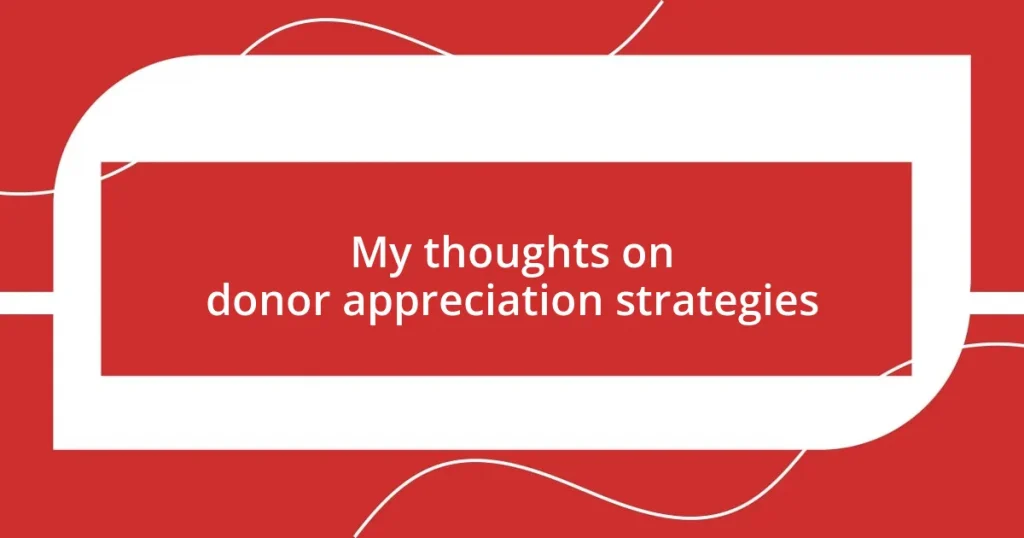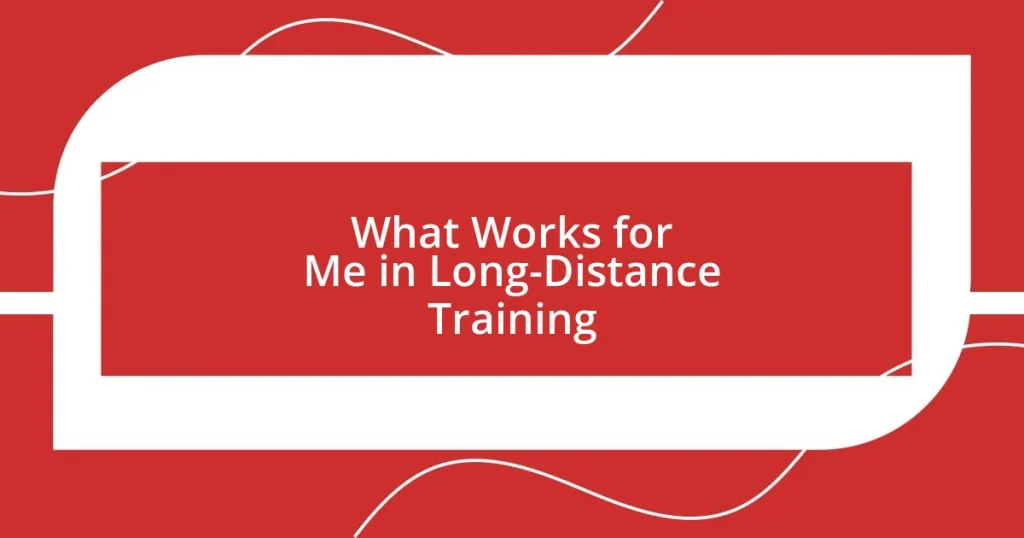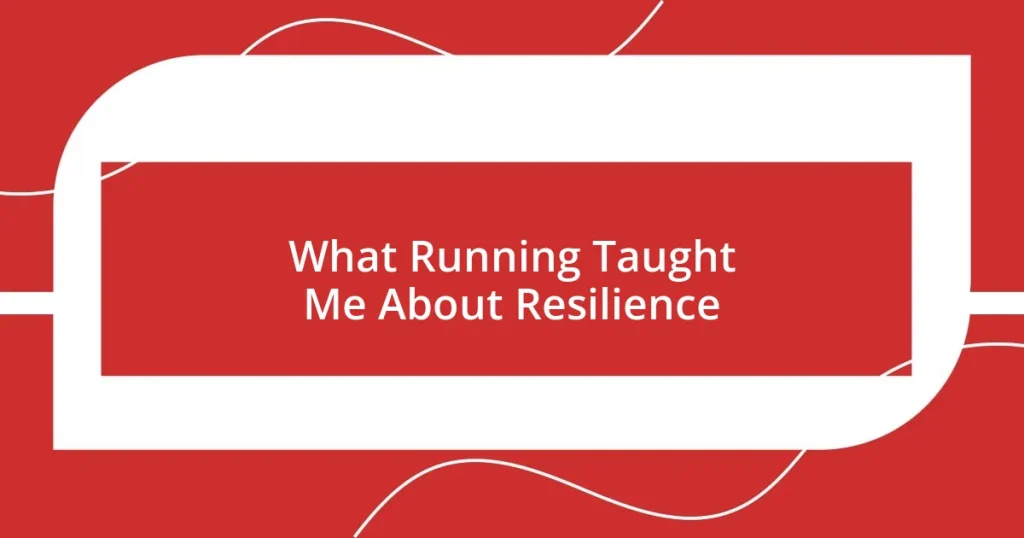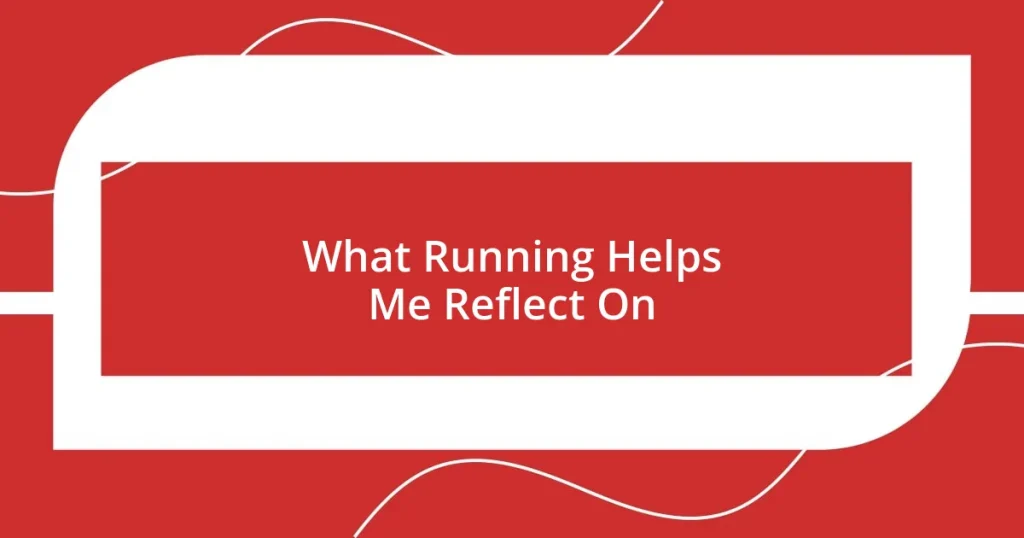Key takeaways:
- Personalized gestures, such as handwritten notes and tailored thank you gifts, significantly enhance donor appreciation and strengthen emotional connections.
- Recognizing donors publicly not only fosters a sense of belonging but also enhances the organization’s reputation, encouraging further support.
- Engaging donors through regular communication, project updates, and invitations to events builds long-term relationships and a community sense.
- Measuring the impact of appreciation strategies through feedback and engagement metrics helps organizations refine their approach and deepen donor connections.
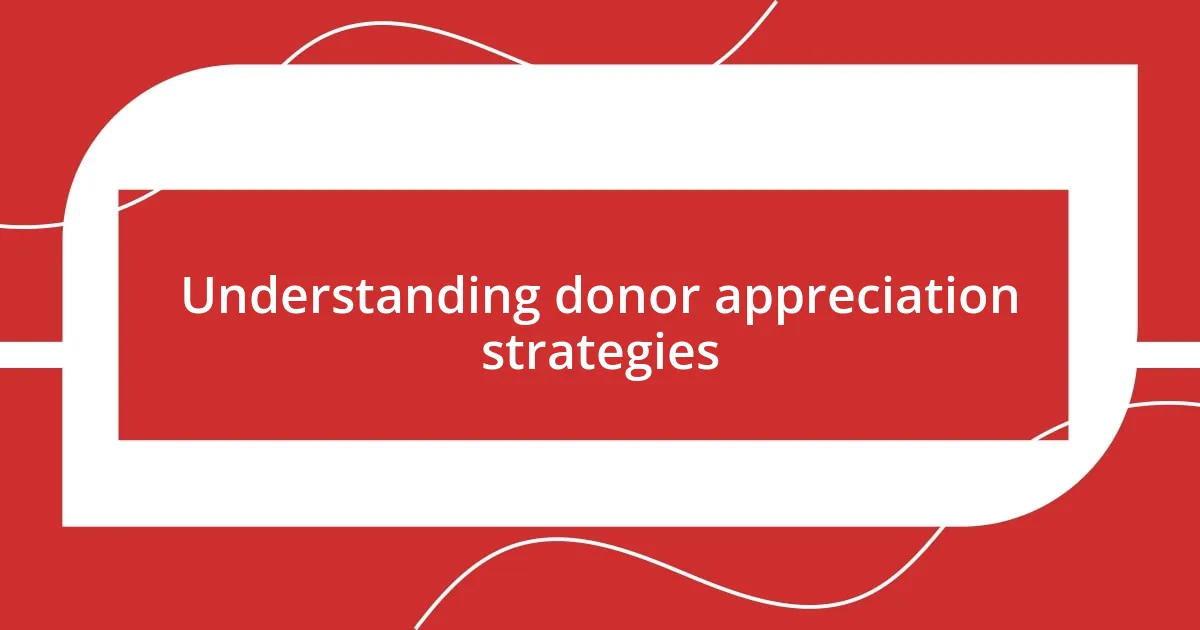
Understanding donor appreciation strategies
Understanding donor appreciation strategies goes beyond just saying “thank you.” I’ve discovered that truly connecting with donors requires a personalized touch—something that reflects their unique contributions. For instance, when I received a heartfelt handwritten note after supporting a local charity, it felt like my contribution mattered, sparking a desire to give again. Isn’t it fascinating how a simple gesture can create lasting loyalty?
In my experience, timing is everything in donor appreciation. A quick response after a donation signals that their support is valued, but sustained communication keeps that appreciation alive over time. I once attended a small gathering where donors were recognized individually; the heartfelt stories shared about how their contributions made a difference created an emotional bond that I’ll never forget. Have you ever felt that warmth when someone acknowledges your efforts?
Another strategy that resonates with me is involving donors in the journey of the organization. When I see updates on projects they’ve funded, it feels rewarding to witness the impact of my contribution firsthand. Wouldn’t you agree that knowing your support drives real change makes you feel part of something bigger? Engaging donors in this way fosters a sense of community and shared purpose, which enhances their overall experience and encourages continued support.
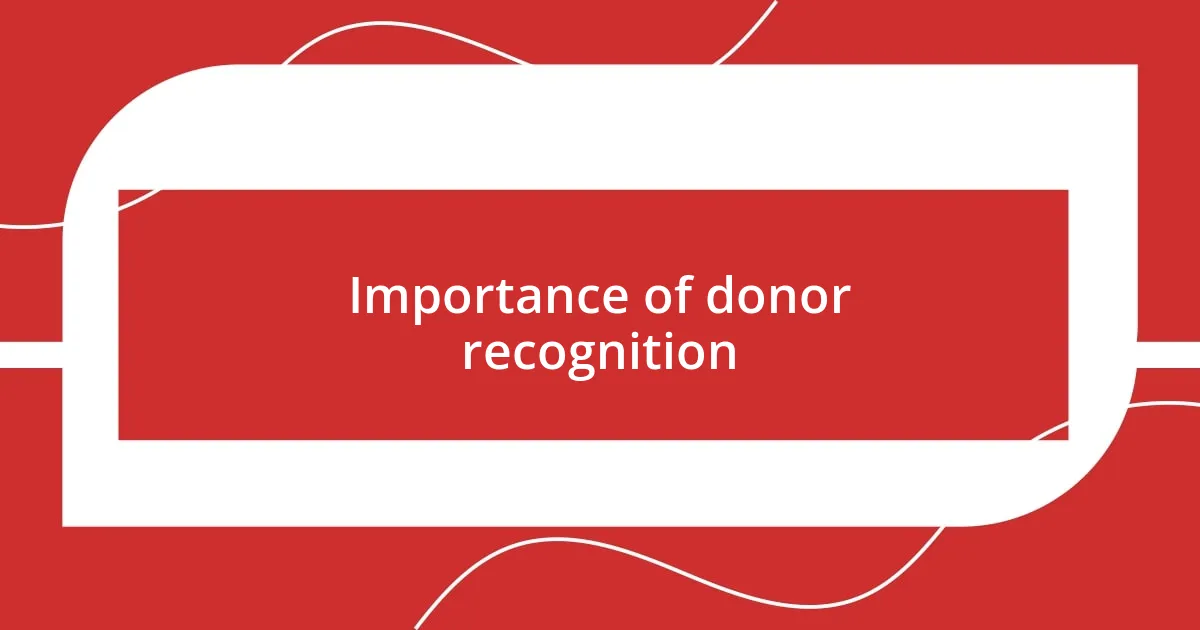
Importance of donor recognition
Recognizing donors is crucial because it reinforces their role in the mission of an organization. I remember a time when I received recognition at a fundraising event; it wasn’t just the applause that mattered, but the acknowledgment of the impact we, as a group, were making. This sense of belonging can motivate donors to deepen their commitment and foster long-lasting relationships.
Leveraging different recognition strategies can make a significant difference in donor retention. Personal touches, like a mention in a newsletter or a shout-out on social media, resonate well. I once saw a nonprofit share stories about each donor’s contribution, which made me feel valued. When donors see their efforts highlighted, it transforms an impersonal transaction into a meaningful partnership.
Moreover, donor recognition cultivates a positive reputation for the organization. A charity that treats its supporters well naturally attracts more. From my perspective, word of mouth can be incredibly powerful. I’ve shared my great experiences with others, encouraging them to support causes I care about. This ripple effect underscores that recognizing donors isn’t just a nice gesture; it’s a strategic move that benefits the entire organization.
| Recognition Type | Impact |
|---|---|
| Personalized Thank You Notes | Builds emotional connection and encourages future giving |
| Public Acknowledgment | Enhances reputation and draws in more supporters |
| Project Updates | Engages donors and reinforces their role in driving change |
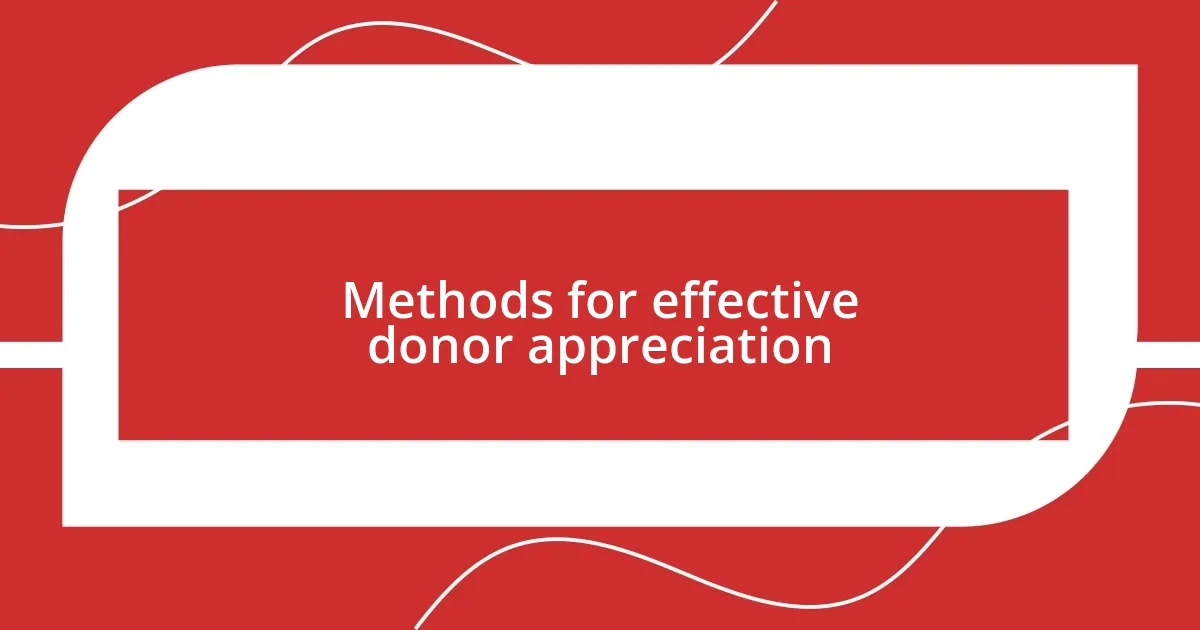
Methods for effective donor appreciation
When it comes to donor appreciation, I find that creative and meaningful gestures often have the most impact. For example, I once received a small, hand-crafted gift that was intricately connected to the project I supported. It wasn’t just a token; it made me feel like a true partner in the cause. That little surprise sparked a warm emotional connection, and I couldn’t help but share my positive experience with friends, further expanding the organization’s reach.
Here are some compelling methods for effective donor appreciation:
- Tailored Thank You Gifts: Customized gifts that reflect the donor’s interests can enhance their emotional connection to the organization.
- Impact Reports: Sending donors updates that illustrate the tangible effects of their contributions deepens their investment.
- Exclusive Invitations: Offering early access to events or special gatherings fosters a sense of belonging among donors.
- Spotlight Stories: Sharing stories that showcase a donor’s specific impact not only honors their contribution but also inspires others.
These approaches speak volumes about the organization’s commitment to its supporters, making them feel valued and appreciated.
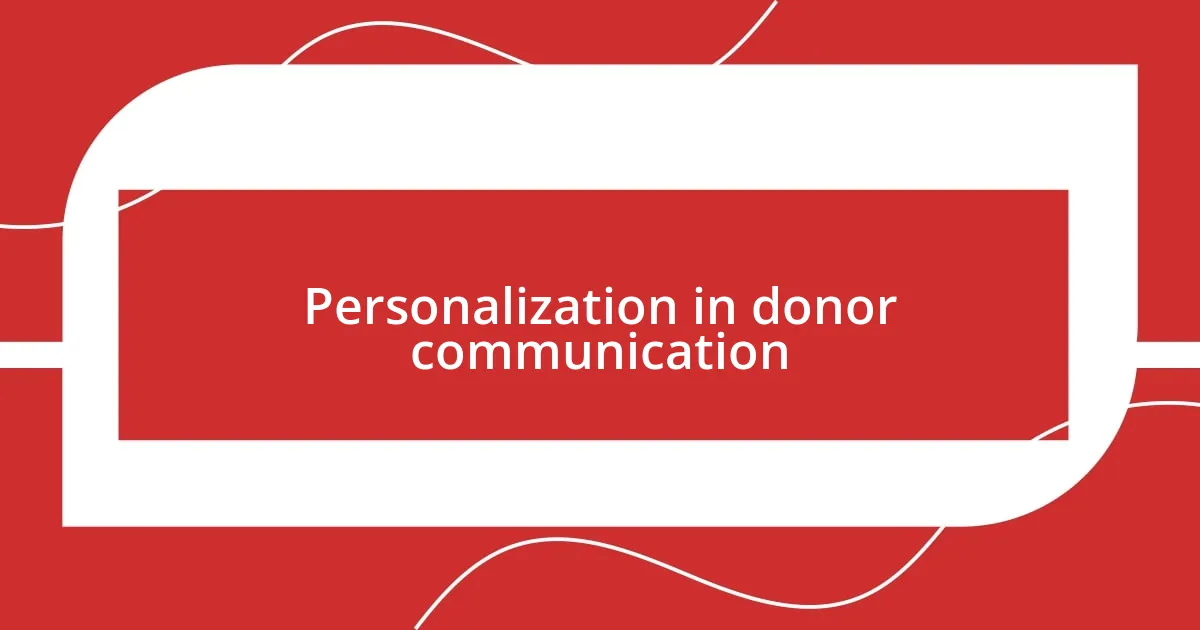
Personalization in donor communication
In my experience, personalization in donor communication goes a long way in making supporters feel truly valued. I once received a handwritten note from a nonprofit thanking me for my specific contribution to a project I was passionate about. That personal touch made me feel like my support mattered and was noticed, rather than just being another line in a spreadsheet. How could a simple note have such a profound impact? It transforms the relationship from transactional to relational.
Additionally, I believe tailoring messages to reflect a donor’s unique interests can significantly enrich their experience. For instance, when I was thanked for my involvement in environmental efforts, the organization included details about how my contributions directly benefited a local community project I cared about. This not only acknowledged my generosity but also reinforced my connection to the cause. It begs the question: wouldn’t every donor appreciate knowing precisely how their support is making a difference?
Effective communication isn’t just about relaying information; it’s about creating an emotional bond. I often think about how a personalized approach cultivates charitable loyalty. For instance, during a recent campaign, I noticed how updates showcasing donor stories fostered a sense of community. It hit home for me when I saw my friend featured along with her impactful donation story—her enthusiasm was contagious, encouraging others to engage as well. Wouldn’t you agree that such connections can inspire even greater giving?
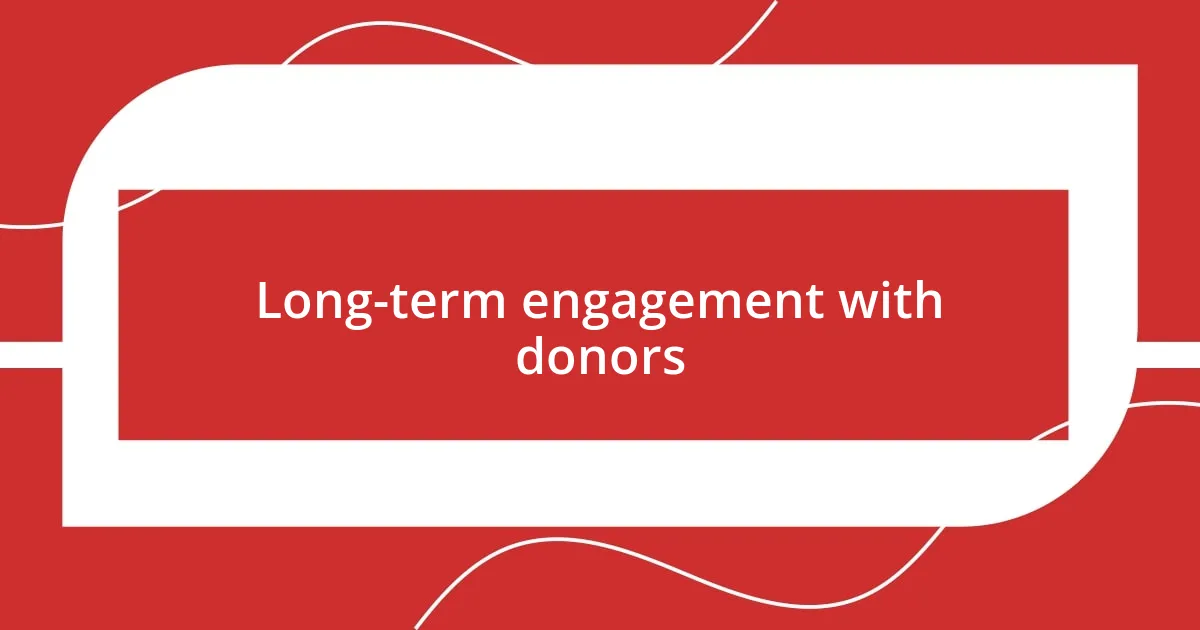
Long-term engagement with donors
Long-term engagement with donors hinges on building lasting relationships that go beyond financial transactions. I recall an organization that invited me to join their advisory board after a few years of consistent giving. This was not just an acknowledgment of my contributions; it made me feel like a crucial part of their journey. How powerful is it to feel your voice matters in decisions that shape a cause you care about?
Moreover, regular check-ins can do wonders for donor relationships. I remember receiving a quarterly phone call from a nonprofit leader who genuinely wanted to know what motivated my support. It wasn’t a pitch; it was a heartfelt conversation about shared goals and visions. How often do we get to be part of something bigger than ourselves, where our ideas and passions are actively sought out? This kind of interaction not only solidified my connection but also made me feel invested in their mission for the long haul.
Events that celebrate milestones are also essential for engaging donors over time. I attended a gala marking the organization’s 10th anniversary, and it struck me how personal stories showcasing long-term impacts foster a strong sense of community. Seeing the faces behind the mission reinforced why I supported them initially. I often wonder if other organizations recognize the profound power of such gatherings. Wouldn’t it be rewarding for donors to see firsthand the vibrant community they’ve helped build?
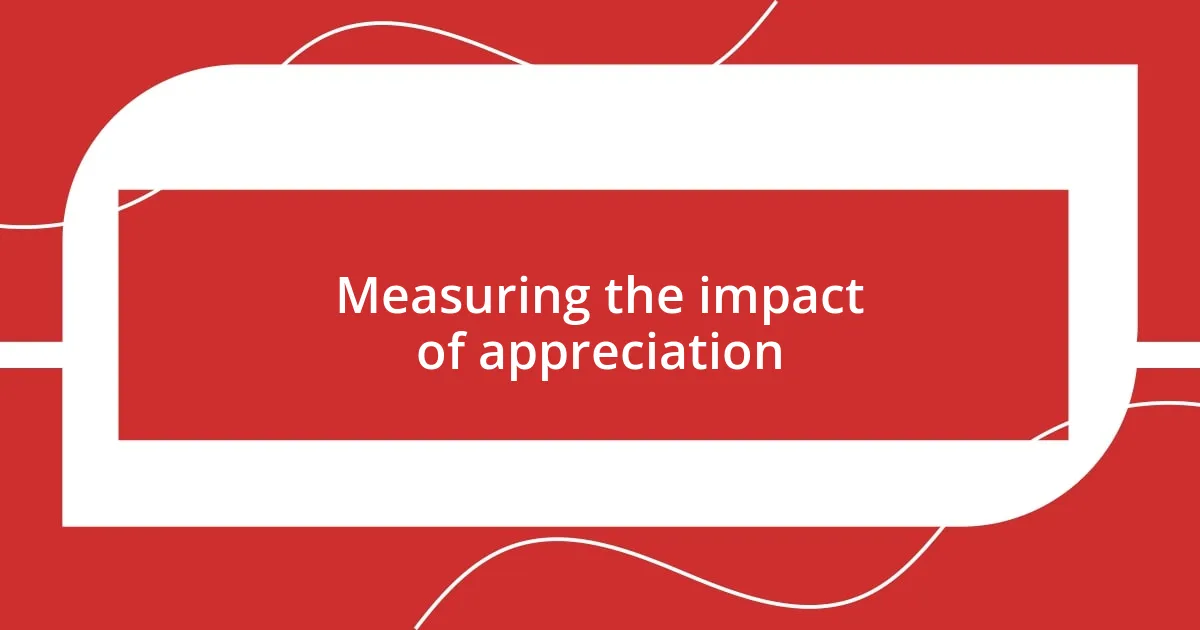
Measuring the impact of appreciation
Measuring the impact of appreciation is an essential practice that can illuminate the effectiveness of donor communication strategies. I remember when I received a follow-up survey that aimed to evaluate how appreciated I felt after donating. The organization leveraged my feedback to refine their appreciation strategies, showing me that they genuinely cared about my perspective. Isn’t it fascinating how this kind of responsiveness can deepen a donor’s connection?
In my observation, tracking engagement metrics post-appreciation efforts provides valuable insights. For instance, I saw an organization compare donation rates before and after implementing a thank-you video campaign. The spike in donations clearly indicated that donors felt more valued and thus more inclined to contribute again. Could this not be a compelling argument for investing in genuine appreciation initiatives?
Additionally, organizing focus groups with donors can unveil the true impact of appreciation efforts. I took part in one where participants shared their feelings about various appreciation tactics, from handwritten notes to celebratory events. Hearing others express their joy over these gestures reinforced my belief in their importance. Don’t you think such open discussions can enhance organizations’ strategies and foster stronger donor relationships?










